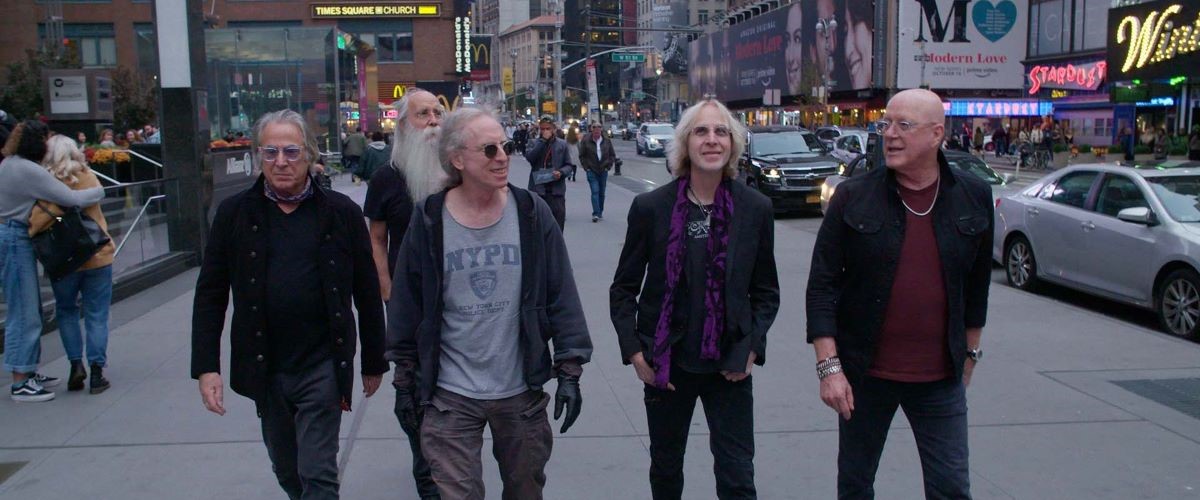In his previous film, “The Wrecking Crew,” director Danny Tedesco recounted the history of American popular music of the 1960s through the stories of a group of studio session musicians who made indelible, if largely unsung (pun perhaps slightly intended), contributions to the recordings of artists ranging from Frank Sinatra and Bing Crosby to the Byrds and The Beach Boys to the Chipmunks. With his latest documentary, “Immediate Family,” he endeavors to do the same thing for the music of the Seventies and Eighties by focusing on four studio musicians—guitarists Danny Kortchmar and Waddy Wachtel, drummer Russ Kunkel and bassist Leland Sklar—and highlighting how their efforts helped to shape and define the soundscape of that era through the legendary tracks that they appeared on during that time.
If those names do not immediately ring bells for you, I can assure you that if you have even a passing interest in the music of that period, their names can almost certainly be found on a number of the albums sitting in your collection. Among the people that they played with during that time are such luminaries as James Taylor, Phil Collins, Don Henley, Jackson Browne, Linda Ronstadt, David Crosby, Carole King, Stevie Nicks, Neil Young and Keith Richards and those are just the ones who turn up for interviews testifying to the musical accomplishments of these collaborators. Tapestry, Sweet Baby James, Running On Empty, Excitable Boy, Building the Perfect Beast, Talk is Cheap—these are just a few of the albums that would achieve classic status due in no small part to their talents.
What is intriguing to note as the film goes on is that each of the four players under focus here clearly possessed enough talent (and still do, to judge by moments in which we see them playing along with recordings of some of the songs that they worked on decades ago) to have forged their own careers if they wanted to go down that path. In each case, however, they decided at some point that the life of the studio musician was more to their liking—they may not have gotten as much personal glory as the people they were supporting (though, unlike the members of The Wrecking Crew, they at least received proper credit for their contributions) but they were able to make their musical marks to a much greater degree than they would have if they were only doing their own thing all the time. Additionally, when the country-pop stylings that they were known for in the Seventies were pushed to the side for the more modern synth-based sounds of the Eighties, they adapted to the times and their careers continued to thrive.
Although the film contains plenty of performance footage, testimonials from their star collaborators and nifty archival material, the best parts of the film come from simply listening to these four shoot the breeze and recount stories about life in the studio and on the road. While they all have entertaining tales to tell—Kortchmar recounts a great one in which he pulls up in traffic next to a car where the driver is bouncing along to the sounds of “All She Wants to Do is Dance,” one of the songs that he wrote for Henley—the best belong to Wachtel, who recounts hilarious anecdotes about everything from the recording of Warren Zevon’s immortal “Werewolves of London” to the time he and Ronstadt went to a strip club and she ended up singing to the ticket seller to prove who she was after having forgotten to bring any identification to the way he improvised the guitar solo at the center of Steve Perry’s “Oh Sherrie” as a substitute for the originally planned saxophone solo.
As was the case with “The Wrecking Crew,” Tedesco does not exactly demonstrate himself to be particularly artful from a filmmaking perspective or insightful from a journalistic one—he is clearly a fan who is excited enough about being around so many musical legends that he seems unwilling to say or do anything that could potentially rock the boat. While that kid gloves approach might have hurt another film of this type, I didn’t really mind it that much here because this film is clearly meant to be a celebration of these men and their legacy that serves as both a warm and undeniably tuneful nostalgia bath for those who grew up listening to their work and an effective oral history of a particular place and time in the history of American popular music. Viewers will find themselves entertained and curious to get home and see just how many of the records in their collections bear the creative imprint of these guys.




















